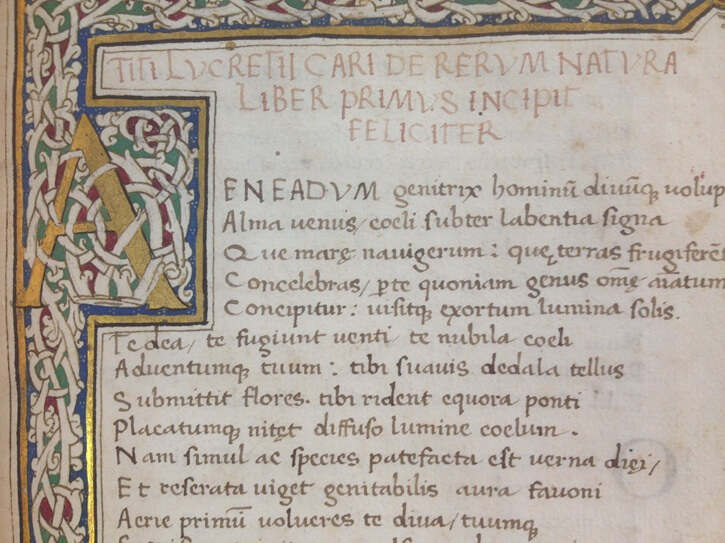Why come to college in Western Pennsylvania and take Latin? For one thing, you’ll learn that the name of your new home state comes from William Penn, sure; but that “sylv-” root? That’s Latin for “forest” (silva) – hence, Pennsylvania, “Penn’s Woods.” Beyond being helpful in state trivia, Latin, of course, is the language of law, theology, philosophy, anatomy, et cetera… Students taking it are not merely majors but many are Pre-Med students, or students interested in understanding the Latin Mass, or writing majors who want to get a better understanding of how language works – and, in studying Latin, your grasp of English grammar will grow exponentially.
And in terms of Latin being an arcane, unapproachable “dead language” that has not been actively spoken in a millennium? Well, you already know more Latin than you might think: E.g., did you blink an eye at et cetera in the previous paragraph? No – and that’s Latin, literally, “And the remaining things.” Ditto e.g.: Exempli gratia, “For the sake of example.” And if we can get a little nerdy for a second: Latin is a beautiful language, whose complexity cannot be fully captured in an English translation. Perhaps most importantly though, at the very least, in taking Latin you’ll be able to tell what Super Bowls the Steelers have won: IX, X, XIII, XIV, XL, XLIII.

Related Faculty
- A. J. Korzeniewski
- Christian Wildberg
- D. Mark Possanza
- Ellen Cole Lee
- Grace Funsten
- Jacques A. Bromberg
- John Newell
- Marcie Persyn
- Sarah Brucia Breitenfeld
- Wesley B. Scott
Publications
- ‘Which the Greeks Call…’: The Rhetoric of Code-Switching in De architectura 3.1
- Cydippe Defixa: An Examination of Ovid’s Magical Language In Heroides 21
- The Poet, the Puella, and the Penis: Impotence and Elegiac Failure in Maximianus and Ovid
- A Learned Dog: Roman Elegy and the Epitaph for Margarita
- May the Thief Become as Liquid as Water: Persuasion and Power in a Curse Tablet from Roman Bath
- Divina Mens: Imperial Propaganda in De architectura 6.1
- Cultural exchange and colonization: considering Roman-Italian relations within the context of contemporary postcolonial literature and theory
- Fair to see, soon to fall: the classical heroine and Tolkien's "unmortal" women
- Lucilius Philosophos? Manipulation of Greek Philosophy in the Early Roman Satires
- Optical theory and feminine auctoritas within Chaucer's the Tale of Melibee with an English translation of Albertanus of Brescia's Liber consolationis et consilii in full
- Pliny’s Telemacheia Epic and Exemplarity under Vesuvius
- Infelix Dido vs. Δεινὴ Medea: Fate and the Puella Relicta Trope in Ancient Myth
- Ludovico Ariosto, Latin Poetry
- Go to Hades! Representations of the Underworld in Antiquity
- REVIEW: A New Text of Apuleius: The Lost Third Book of the “De Platone.” By Justin A. Stover
- The Harvard Vergil: Memoir of The Black Sheep
- I Dreamed a Dream: The Psychology Behind Aeneid ii.268-297 and vii.404-474
- The Growth of Venus
- Poetry Underpinning Power, Virgil's Aeneid: The Epic for Emperor Augustus
- Serpentine Constructions: Lucretius, de rerum natura
